Tips & Tricks
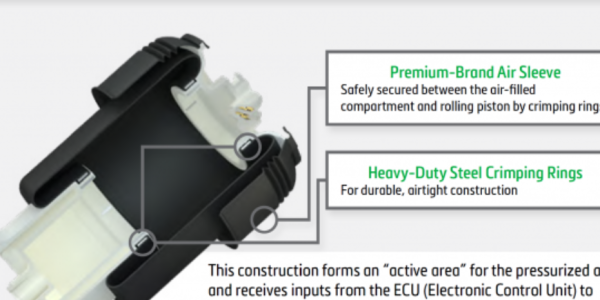
5 Signs That Your Air Spring Is Leaking
Discover 5 common signs that your air spring is leaking and learn how to fix air suspension problems safely.
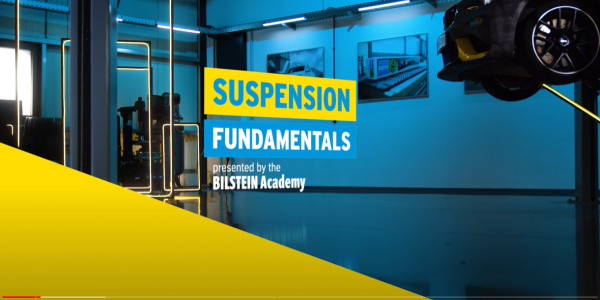
BILSTEIN Academy – Air Suspension
“Suspension fundamentals” powered by BILSTEIN Academy – Air suspensions As part of our video series “Suspension fundamentals – powered by BILSTEIN Academy”, our experts from the BILSTEIN Academy regularly provide valuable practical tips for automotive professionals. In this episode, we are going to take a look at the installation of air suspensions/air suspension modules. Premium suppliers such as Mercedes-Benz, BMW and the like in particular are increasingly equipping their vehicle models with comfortable air suspensions. For car workshops, this development means new target groups and new potentials. However, as is so often the case with innovative technologies, even experienced automotive professionals are apprehensive about working on air suspension systems. Yet the challenges are not that immense, as our suspension specialists from the BILSTEIN ACADEMY reveal. Automotive professionals should always follow our well-illustrated installation instructions step by step during installation. Then installation can be done safely and without any hassle. As far as cheap air suspension modules are concerned: Hands off! Because if you buy cheap, you quickly buy twice. At least!
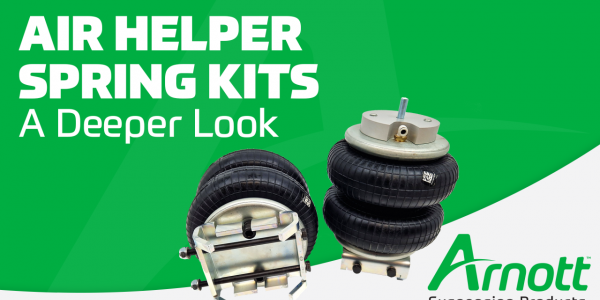
Air spring helper kits – a deeper look
Light commercial vehicles are designed for a wide variety of uses but are mainly used for transporting people, cargo, or a combination of both. This means that LCV manufacturers need to offer multiple configuration options so all customers can tailor the vehicle to their specific needs giving rise to different configurations including people carriers, vans, chassis cabs. Additionally, the different chassis options are selectable with different interior configurations, in multiple lengths, heights and maximum permissible weights. In this article, Arnott will explain the compromise LCV vehicle manufacturers need to make concerning suspension and why an air spring helper kit can provide the perfect solution.
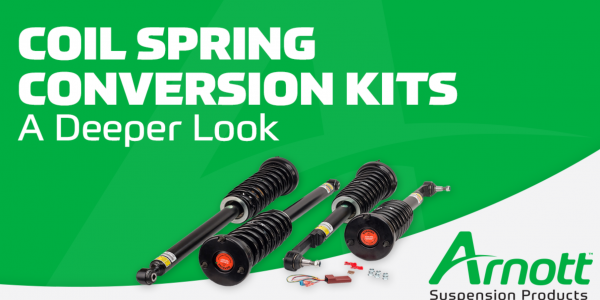
COIL SPRING CONVERSION KITS – A DEEPER LOOK
The demand for vehicles with air suspension is steadily growing because of their beneficial features contributing to vehicle safety, stability and driving comfort. There are also car owners who choose to remove the vehicle’s air suspension system and convert to traditional coil spring suspension. What could be the reason behind this choice? In this short article, Arnott will explain what the advantages and disadvantages are of converting a vehicle from air to coil suspension.
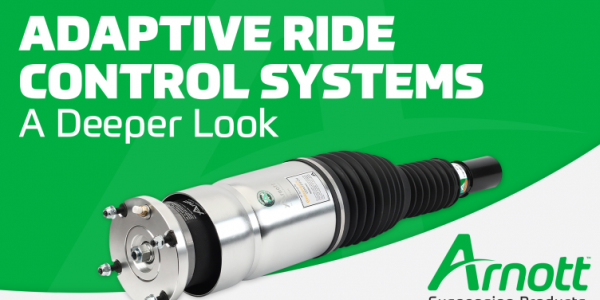
Adaptive Ride Control Systems – a deeper look
As the automotive industry continues to enhance drivability and make the ride more comfortable, suspension technology is key to accomplishing this. Suspension systems have been equipped with classic coil spring and shock absorber set-ups for a long time. Conventional leaf and coil spring systems evolved into innovative air suspension systems, and regular hydraulic shock absorbers evolved to highly advanced adaptive damping systems (that can be matched with both coil and air suspension systems). These innovations optimized the ride and handling for different driving conditions. In this article, Arnott will explain how adaptive damping systems operate, providing a better understanding of how this suspension technology works.
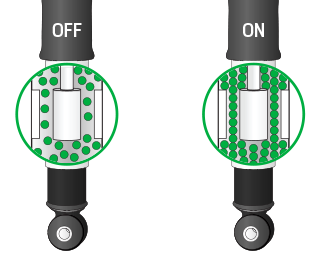
MAGNETIC RIDE – A DEEPER LOOK
Automotive magnetic ride systems are quite unique compared to any other electronically controlled adjustable damper systems. Controlled damper systems typically consist of a continuously variable damper, an ECU, and a sensor set. Although these systems all function in a similar manner, the working principle of a magnetic ride damper is very different. Most adjustable dampers are based upon conventional hydraulic monotube or twin tube dampers. These adjustable dampers are filled with hydraulic oil and use conventional shock valves along with electrohydraulic proportional flow control valves. This permits a wide range of damping force adjustment from very soft to extremely stiff. Magnetic ride dampers look like a conventional hydraulic-based monotube damper from the outside but are completely different internally. Magnetic ride dampers contain a simple electromagnet assembly and a special liquid known as magnetorheological, or MR, fluid.
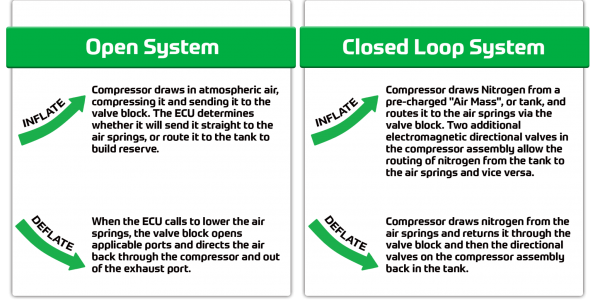
Closed loop systems - A deeper look
Properly diagnosing possible system errors or defects, ensuring theProperly diagnosing possible system errors or defects, ensuring the correct working procedures are followed, correctly installing new air suspension components, and checking the system and making it operational again after an air spring leak is different from the conventional open air suspension system. In this article, Arnott will provide more insight into the alternative closed loop system. correct working procedures are followed, correctly installing new air suspension components, and checking the system and making it operational again after an air spring leak is different from the conventional open air suspension system. In this article, Arnott will provide more insight into the alternative closed loop system.
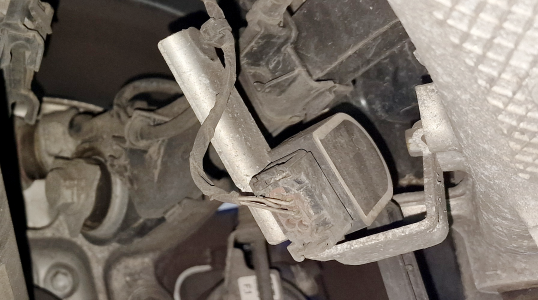
THE INFLUENCE OF AIR SUSPENSION DURING WHEEL ALIGNMENT
When technicians talk about wheel alignment, they are referring to the adjustment of the vehicle’s suspension to align the angles of the tires according to the manufacturer’s specifications. Tire misalignment can be the result of hitting a curbstone too hard, driving through a large pothole at high speed, or a collision, and also after repair or replacement of steering and suspension components. Since air suspension is a part of the vehicle suspension, it can influence the wheel alignment process after a replacement or repair.
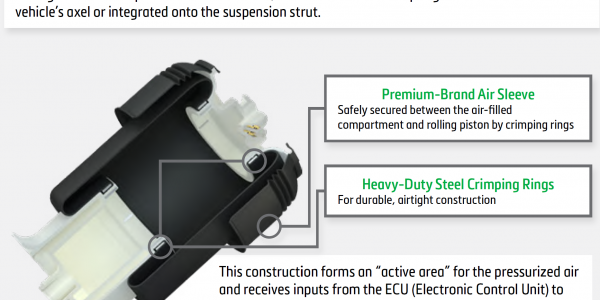
Air Spring Installation Tips & Tricks
Being the aftermarket air suspension specialist, Arnott is keen to make sure all installers feel confident and are well informed when working on air suspension systems. In this article, we provide you with some valuable tips and tricks for an air spring replacement.
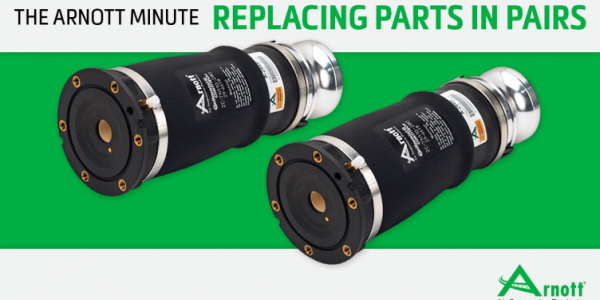
Air suspension components – Why replacement in pairs is important
The main components of an air suspension system, the air springs and air struts, contain rubber sleeves. Rubber is a natural product prone to wear and tear causing the air sleeve to be the first component to wear out. Often, the rubber will dry rot and small cracks form where the air sleeve continuously rolls up and down the rolling piston during the spring movement. When the vehicle is being inspected, it is recommended that the air sleeves are checked for these small cracks and, if present, replaced to avoid the cracks developing into a bigger leak over time.
